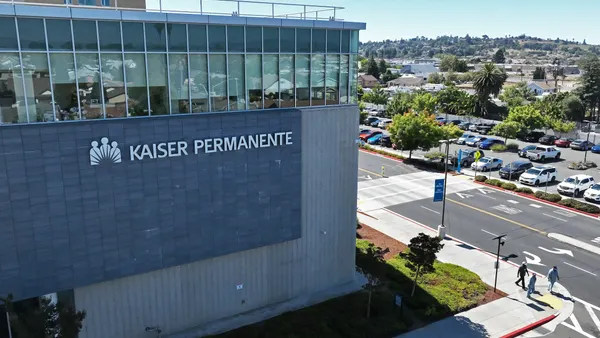Dive Brief:
- Anticipated complications—and not poor care—are the primary culprit in hospital readmissions after surgery, according to a new study from Northwestern Medicine and the American College of Surgeons, published this week in the Journal of the American Medical Association, according to a Northwestern press release.
- The study, titled "Underlying Reasons Associated with Hospital Readmission Following Surgery in the United States," found that most surgical readmissions are not due to poor care coordination or mismanagement of known issues. Instead, readmissions were due to expected surgical complications, such as wound infections, that occurred after discharge and were not present during a patient's hospital stay more than 97% of the time.
- "Our results highlighted that many of the complications involved in readmissions, such as surgical-site infections, are already well-known and part of other CMS pay-for-performance programs, which means hospitals are effectively being penalized twice for the same complications," said lead author Karl Y. Bilimoria, MD, MS, a surgical oncologist and vice chair for quality at Northwestern Memorial Hospital.
Dive Insight:
These JAMA results may force health leaders to re-evaluate some of their key anti-readmissions efforts. Right now, hospitals put incredible pressure on surgical physicians and staff to keep readmissions—long the scourge of the healthcare accountant—down to a minimum.
The prevailing wisdom has always been that there must be something wrong to account for all these patients going back to the hospital.
However, human beings are not Chryslers, and if they have to go back to the shop, it's not necessarily because the mechanic screwed up more than they fixed. This study strongly supports what every surgeon has probably told an administrator at one point or another—that surgical readmissions are not a plague on the healthcare industry, but rather, they are necessary to address complications that present differently from patient to patient.
A word on the methodology: Researchers collected data from the American College of Surgeons' National Surgical Quality Improvement Program from 346 US hospitals for the full year of 2012. Six different surgical procedure types were reviewed based on their clinical and CMS policy relevancy, resulting in a total of 498,875 separate patient cases being analyzed for the study. And what researchers found is that surgeons are being blamed for much they can't control. Researchers found that of the 5.7% of the patient cases with unplanned readmissions, only 2.3% of those patients were readmitted due to a complication that occurred during their initial stay in the hospital.
Currently, a hospital's rate of all unplanned patient readmissions, which includes surgical patients, is publicly reported by CMS. A hospital's reimbursement from CMS gets reduced if the agency determines that a hospital has too many readmissions within a period of 30 days following a patient's discharge for certain care, including total hip and knee replacement surgery.
This policy, known as the Readmissions Reduction Program, became effective on October 1, 2012 as part of the Affordable Care Act, but it initially only focused on readmissions for heart attack, heart failure and pneumonia. The study authors note other surgery types will be incorporated into CMS' Readmissions Reduction Program in the near future.












